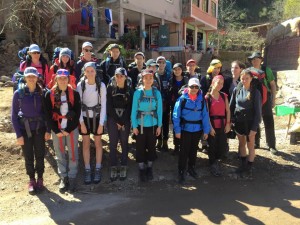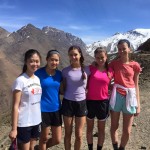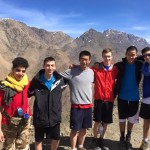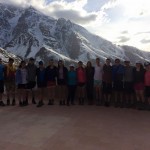 Five immensely long and satisfying days went by. There are so many words to describe these last few days, it is virtually impossible. But Mr. Salkeld insisted that this blog be written, so feast away at the concoction of anecdotes.
Five immensely long and satisfying days went by. There are so many words to describe these last few days, it is virtually impossible. But Mr. Salkeld insisted that this blog be written, so feast away at the concoction of anecdotes.
On our first day, we drove at the crack of dawn to the Atlas Mountains. What was once an ominous outline in the horizon reminding us of our faith was now getting closer on the Marrakech road. On the drive through the mountains to our starting point, we were all full of anticipation; for most of us this would be our first hiking trip. After we unloaded from our vans, we met the people who would be accompanying us, as well as our furry friends, the mules. While at first the guides insisted that we let the mules carry our packs, a firm head-shaking from Mr. Salkeld was all that was needed to let us know that we would be the mules on this trip. At the starting point, we were greeted with refreshing Moroccan mint tea and cookies. We began our hike going uphill, through a small village, and were greeted with waves and smiles from the Berber children. The hospitality encountered at the beginning of the trek continued throughout the excursion.
Walking uphill on the first path was quite a shock to some people. I was personally and particularly affected by it and started getting nervous that the entire hike would be as demanding as the beginning. But after some words of wisdom from Mr. Maurice on pacing myself and finding a rhythm to walk to, I found that with each day it took much more to make me tired. As we made it to the top of the mountain, we got a chance to see the diverse terrain of Morocco. Spread throughout the Atlas Mountains, we saw everything from snow patches to green forests and red mineral soil.
At the arrival of our first meal in the mountain, there was a carpet and long, thin cushions laid out for us to sit on, as well as some mint tea. The Berber men accompanying us on our hike had prepared a feast for us. An assortment of Moroccan salads, fresh baked bread, and the meatball tagine they prepared for us was greatly appreciated and devoured by everyone. For dessert, there was a plate of fruit with the sweetest oranges most of us had ever tasted. After this meal and rest, I had a newfound love for hiking. No meal and momentary rest had ever felt so satisfying.
For our first night, we stayed at a simple Berber house equipped with mostly just the essentials. We ate couscous with chicken and vegetables that the Berber men prepared for us. They then entertained us with some traditional Berber music, filled with drums and their Berber chants. We listened and clapped along to the first song, but were then quickly ushered to the dance floor. We learned the traditional dances and this little party helped warm us up for the cold Atlas night.
In the morning, we woke to the sounds of roosters and prayer calls. We had our breakfast consisting of Moroccan breads, M’semn (Moroccan crepes), jams and honey, and fresh omelettes. The second day of the hike was the longest and the most demanding. We hiked uphill through hot mountain forests and over slippery trails of snow and ice, with the blazing sun keeping us warm.
Although it was the most demanding day, we saw incredible views of the villages in the valleys, as well as the fields with intricate irrigation systems similar to that of Machu Picchu. In addition, we saw a half-frozen waterfall in the mountains and walked through the village in the valley, seeing all of the barns where the goats and sheep are kept.
After lunch, we looked in the distance and one of our hiking guides, Hassan, pointed out where our final destination was; a small village in the distance at the bottom of the mountain we had just trekked. As we were walking towards the village, the downhill trek seemed never ending and the village appeared to be getting smaller, which was alarming to many of us. It took us the entire afternoon until nightfall to reach the village. We walked the streets of the valley village at night hearing the sounds of families in their homes, as they were preparing meals and watching Arabic television.
We arrived at a Riad, which was an immense improvement over the simple Berber house. The decoration in the Riad was intricate and more extravagant. We sat in the Moroccan salon, drank tea, and rested before going to our rooms. Our rooms had warm beds and we had proper showers as well (although it took a couple of hours to fix the hot water). It was very fitting to have our most comfortable sleeping arrangements after our hardest hike.
The hikes for the following three days were mostly downhill and much more pleasurable. We walked on the tight roads on the mountains, and occasionally a truck or a motorcycle would drive by and would always wave and yell greetings to our hiking guides. It made me a little envious to know that they grew up in such small villages. Everyone was so nice to each other and there was always a sense of community. We saw women share the workload, while listening to some traditional Berber music on their phones or radios. They took turns bringing firewood, washing clothing, and cooking. Some did all of this while having a child on her back, wrapped with a scarf.
We listened to more enthusiastic drumming and chants the other nights and danced after eating delicious homemade Moroccan food. Hassan and Mohammed (our hiking guides) took us to visit a Berber home. The home was very simply designed, containing mostly the essentials. There were light bulbs, a kitchen, television, and Moroccan-style seating area. These areas are made to accommodate many guests at a time because hospitality is a very important part of the culture. We sat in the living room with a long sofa outlining the room leaving the centre an open area for coffee tables and walking.
On the last evening, Ms. Owen and a handful of us got a chance to play with the village children outside. They had just finished school and we saw all of them run to their homes to throw down their backpacks so that they could play outside (something I found very relatable). This was one of the most rewarding things we got to do because we learned many Berber children songs and got close with many of the kids. They taught us some of their games and we showed them some of ours. They were very enthusiastic, cute, and respectful. At around 7:30 pm their mothers stood outside their homes and called the children in one at a time for supper. The village streets, which were full of laughter and shouts, quickly became empty. This was our cue to go back inside to eat our own supper. (Shout out to Loubna and Hakim and the other Berber kids). It was very difficult saying goodbye to them the next morning, but we said farewell with tight hugs and smiles.
Although the trip was physically demanding, the hospitality and kindness of the Berber people made it worthwhile. It even felt like the Atlas Mountains themselves were welcoming us into their vast scenery. (Shout out to Hassan and Mohammed for being amazing hiking guides and the whole hiking crew and the family who let us visit their Berber home.)
Choukran to you all,
Nora Althani ’15 on behalf of the Duke of Edinburgh Crew 2015



